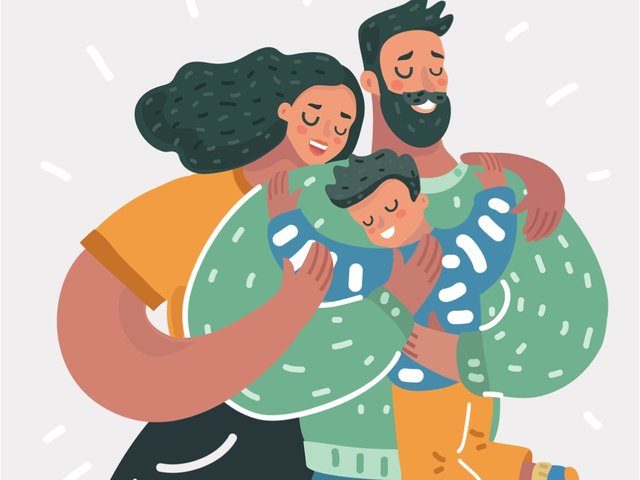Here we are with the new episode of my publications about happiness,
In case I got your attention, and you wish to know more about this topic from me, I invite you to read my previous publications:
- https://steemit.com/hive-197809/@vik24/workshop-chemistry-of-happiness-dopamine
- https://steemit.com/hive-197809/@vik24/how-to-build-a-food-plan-to-regain-a-good-mood
- https://steemit.com/hive-197809/@vik24/how-to-live-a-healthy-and-happy-environment-at-home
Main chemicals of happiness
- Dopamine
- Ossitocine
- Serotonin
- Endorfine
Oxytocin
Oxytocin is involved in a number of important physiological and psychological functions. For example, it promotes maternal attachment, lactation, partner bonding, and group cohesion.
In fact, oxytocin increases pro-social behaviors such as altruism, generosity and empathy and leads us to be more likely to trust others.
These socio-cognitive effects emerge as a consequence of the suppression of the action of the prefrontal and cortico-limbic circuits, with consequent lowering of social inhibitory brakes such as fear, anxiety and stress.
Oxytocin and social relationships
The influence of oxytocin on the perception of faces, emotions and other social information has been extensively studied in recent years.
In recent years, there have been numerous studies that have tried to investigate this phenomenon. The results showed, for example, that oxytocin can increase emotion recognition and brain activity during face perception.
The hormone in question, therefore, appears to play a significant role in the processing of interpersonal information and in the maintenance of social bonds.
It seems that under the influence of oxytocin one feels more extroverted, more open to new ideas and more confident.
Studies have shown that oxytocin (which acts as a hormone but also as a neurotransmitter) plays a role in facilitating the perception of emotions in other people's facial expressions. An international study conducted by Sebastian Korb (researcher in the neuroscience area of SISSA) has tested the idea that this phenomenon is linked to facial imitation. According to the theories of embodied cognition, in fact, the recognition of the emotions of others is facilitated by their imitation, that is, by their reproduction on our own face. The study confirms the facilitation effect, which is more pronounced for expressions that convey negative emotions ( anger, sadness ), especially when observed on a child's face.
Sebastian Korb, researcher at the International School of Advanced Studies (SISSA) of Trieste and expert in Facial Mimicry (facial imitation) wondered what is the mechanism responsible for facilitating the recognition of emotions after the administration of oxytocin. To test the link between oxytocin and facial mimicry, Korb and colleagues selected a sample of 60 adult males, where half of the sample received a spray dose of oxytocin, and half a spray dose of placebo (neither the participants nor the experimenter knew which product it was).
The subjects, after a period of time sufficient for the drug to take effect, were subjected to some evaluation and recognition tests of emotional expressions presented in short videos that portrayed adult or infant faces.
As they performed the tests, the response of the facial muscles was also recorded, to measure facial imitation.
The results showed that the imitation of expressions was more marked in the subjects who received oxytocin(compared to placebo), and that this increase in imitation was most evident when subjects observed crying infants (anger and crying are hardly distinguishable in infants).
The result is interesting not only because it shows that oxytocin has a modulator effect on facial imitation, but also because there is a marked response towards infant faces also in males, while it was thought that this type of behavioral-related effects of oxytocin of care were typically feminine.
Oxytocin and bond keeping
The ability to form long-term cooperative relationships is one of the fundamental prerequisites for the evolution of man, in which the oxytocin hormone is at stake.
Researchers have studied this molecule, In particular, an increased level of oxytocin suggest that oxytocin may contribute to fidelity in monogamy relationships, in fact, it seems that romantically engaged men, under the effect of this hormone, tend to keep unknown women judged attractive at a "safe distance" and thus maintaining the condition of monogamy.
Thanks to this study, conducted at the Universität Bonn, the researchers found that oxytocin is effective in reinforcing the avoidance of attractive women in men in a romantic relationship, while it would have no effect on single men. The researchers administered oxytocinor placebo through a nasal spray to a group of heterosexual males; forty-five minutes later, each was asked to evaluate the ideal distance at which to place an experimenter, who was subsequently judged to be attractive to the subject.
Oxytocin led the men involved romantically, but not singles, to keep more distance with the woman. In a second experiment, the researchers also found that oxytocin had no effect in regulating the interpersonal distance between men.
These results identified oxytocinas the main key in the formation of the pair bond and in the monogamous fidelity.
Oxytocin and confidence
In a study, published in the journal Psychoneuroendocrinology, it shows that oxytocin can increase levels of trust in the other even after rejection.
In a double-blind experiment, 100 students were given oxytocin or a placebo substance through a nasal spray and then underwent a social rejection experience.
Specifically, a conversation was simulated in which the participants were interrupted or ignored by some collaborators of the experimenters. The results showed that subjects who reported high levels of emotional distress after being rejected reported greater confidence in other people if they were given oxytocin prior to the problematic interaction than those who - displaying high levels of negative emotion - had received the placebo substance. In contrast, oxytocin had no effect on trust in those who were not emotionally affected by social rejection.
So according to the researchers, if someone feels very distressed in the event of social rejection, oxytocin it could promote trust in the other and the search for social support, avoiding dangerous vicious circles of social withdrawal.
Oxytocin and overcoming fear
A team of researchers was able to demonstrate, in a study conducted by the University of Bonn, that oxytocin inhibits the fear centers of the brain and makes the effect of stimuli related to fear are reduced more easily.
A trauma, but also very scary incidents, are not easy to overcome and sometimes can become so ingrained in the memory as to influence those who lived them, generating anxiety and phobias.
A team of researchers was able to demonstrate, in a study conducted by the University of Bonn in collaboration with the hospital, that oxytocin inhibits the fear centers of the brain and causes the effect of stimuli related to this fear is reduced more easily.
Scary experiences do not fade from memory quickly, but strategies need to be applied to allow this to occur. One of the most common techniques, to try to overcome fears, is to repeatedly experience the same stimulus in a positive situation until this new experience cancels but "overwrites" the traumatic, making the anxiety-inducing stimulus harmless.
However, this process can take a long time and relapses are not rare since the trace of the original fear is still present and well anchored in the memory.
To further study this technique, a team of scientists induced 62 healthy male subjects to associate some images with an experience of anxiety, subsequently, the phase of "extinction" began in which the effect of the frightening stimulus is reduced by superimposing positive experiences on those experienced during the "conditioning" phase.
First, however, half of the participating subjects were given oxytocin via a nasal spray, while the other half received a placebo. MRI brain scans revealed that whoever had received oxytocin showed greater activation of fear-related regions and less amygdala activation than the control group, confirming the anxiolytic effects of the hormone.
All this highlights not only the presence of specific centers charged with the recognition of fear, but, in the future, could lead to the development of new treatments also for anxiety disorders which are nothing more than fears.





Excellent tutorial on happiness. It is interesting to know that oxytocin plays a vital role in our general self-esteem and the behavior we have in front of others!
#affable
Downvoting a post can decrease pending rewards and make it less visible. Common reasons:
Submit